

The Army and the Economy in Egypt. The commanding heights of the Egyptian economy have for decades been populated by groups – Mubarak’s NDP, the Military, and until recently the Muslim Brotherhood – that have been notoriously unwilling to undertake meaningful and desperately needed economic reforms.
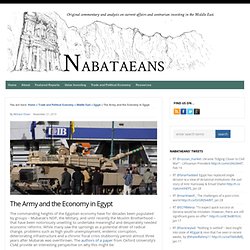
While many saw the uprisings as a potential driver of radical change, problems such as high youth unemployment, endemic corruption, deteriorating infrastructure and a chronic fiscal crisis stubbornly persist almost three years after Mubarak was overthrown. The authors of a paper from Oxford University’s CSAE provide an interesting perspective on why this might be: Revolutionary upheavals can often lead more quickly to de jure change in political institutions, without necessarily altering the distribution of economic power.
Profile: The Arab Organization for Industrialization. At the beginning of the Cairo-Suez desert road stands a building with the look of a military barracks.
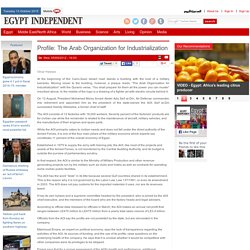
Moving closer to the building, however, a plaque reads, “The Arab Organization for Industrialization” with the Quranic verse, “You shall prepare for them all the power you can muster” inscribed above. In the middle of the logo is a drawing of a fighter jet with electric circuits behind it. On 12 August, President Mohamed Morsy forced Abdel Aziz Seif al-Din, Air Defense commander, into retirement and appointed him as the president of the state-owned the AOI. Seif al-Din succeeded Hamdy Waheeba, a former chief of staff. Egypt's Generals and Transnational Capital. Before and after the ejection of Husni Mubarak from office, the size of the Egyptian army’s share in the economy has been a subject of great debate.
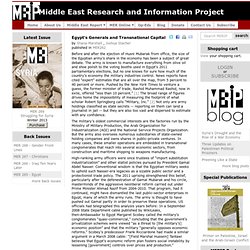
The army is known to manufacture everything from olive oil and shoe polish to the voting booths used in Egypt’s 2011 parliamentary elections, but no one knows for sure how much of the country’s economy the military industries control. News reports have cited “expert” estimates that are all over the map, from 5 percent to 40 percent or more. Pushed by the New York Times to venture a guess, the former minister of trade, Rashid Muhammad Rashid, now in exile, offered “less than 10 percent.” [1] The broad range of figures drives home the impossibility of measuring the footprint of what scholar Robert Springborg calls “Military, Inc.” [2] Not only are army holdings classified as state secrets -- reporting on them can land a journalist in jail -- but they are also too vast and dispersed to estimate with any confidence.
The Egyptian military's economic empire. The Army and the Economy in Egypt, in Jaddaliya: Any discussion of the relationship between the army and economy cannot ignore the military establishment’s near-absolute dominance of the local economy in various Egyptian governorates.
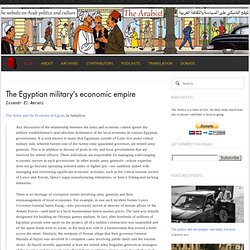
It is well known to many that Egyptians outside of Cairo live under virtual military rule, wherein twenty-one of the twenty-nine appointed governors are retired army generals. This is in addition to dozens of posts in city and local governments that are reserved for retired officers. These individuals are responsible for managing wide-ranging economic sectors in each governorate. This story barely scratches at the details, but is well worth reading. The Generals’ Secret: Egypt’s Ambivalent Market. Egypt’s generals have a big secret: they own at least 35 factories and companies—and they refuse to privatize them.
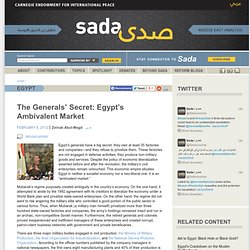
These factories are not engaged in defense activities; they produce non-military goods and services. Despite the policy of economic liberalization asserted before and after the revolution, the military’s civil enterprises remain untouched. This economic empire situates Egypt in neither a socialist economy nor a neo-liberal one: it is an “ambivalent market.” Mubarak’s regime purposely created ambiguity in the country’s economy. On the one hand, it attempted to abide by the 1992 agreement with its creditors to liberalize the economy under a World Bank plan and privatize state-owned enterprises. The Army and the Economy in Egypt. [This is a translation of a Jadaliyya article that was originally published in Arabic.
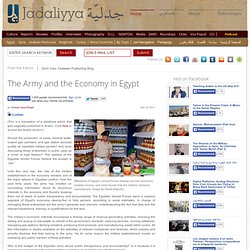
Click here to access the Arabic version.] Should the production of pasta, mineral water, butane gas cylinders, and gas station services qualify as classified military secrets? And does discussing these enterprises in public pass as a crime of high treason? In Translation: Egypt's deep state This week’s translation comes from al-Tahrir, the newspaper edited by Ibrahim Eissa that is among the most critical publications of SCAF and the security services to come out since the January uprising.
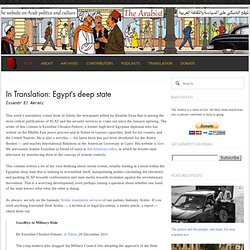
The writer of this column is Ezzedine Choukri-Fishere, a former high-level Egyptian diplomat who has woked on the Middle East peace process and in Sudan in various capacities, both for his country and the United Nations. He is also a novelist — his latest book has just been shortlisted for the Arabic Booker — and teaches International Relations at the American University in Cairo. His website is here. We previously feature Ezzedine (a friend of ours) in this hilarious video, in which he berates state television by introducing them to the concept of remote controls. As always, we rely on the fantastic Arabic translation services of our partner, Industry Arabic.
Military-owned factories threaten farmers' livelihoods in Fayoum.